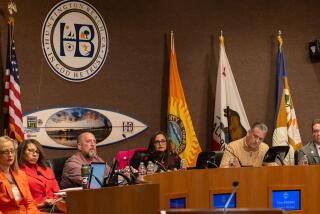Gay rights: Waging a battle for Anchorage via churches and money
Reporting from Seattle — For 35 years — since Anchorage was a city, really — there have been attempts to pass an ordinance banning discrimination against gays and lesbians. Several times, such measures have been on the brink of adoption, only to be repealed or vetoed at the last minute as Alaska’s ardent conservative Christian community cranked into gear.
But antidiscrimination advocates say a new initiative on the April 3 municipal ballot — gaining almost more attention in Alaska these days than the U.S. presidential race — has won unprecedented support from faith leaders, including the Episcopal bishop and some 50 other churches and religious groups.
Twice as many churches have mobilized to defeat the measure.
Now, thousands of dollars in contributions from grass-roots advocates on both sides, as well as from donors outside Alaska, are funding an onslaught of television and radio ads as Alaska becomes the latest front in the national debate over gay rights.
The initiative would build on the city’s existing ordinance prohibiting discrimination in housing, employment and similar spheres on the basis of race, color, sex, religion, national origin, marital status, age or disability. Protections for gays, lesbians and transgender persons would be added to that ordinance.
At least 150 cities, counties and states across the U.S. have passed similar laws, but Anchorage has touched off a political firestorm every time it has tried to do so. The most recent attempt was in 2009, when the Anchorage Assembly adopted an ordinance that was vetoed by Mayor Dan Sullivan.
In December, advocates for the measure collected 13,515 signatures in support, more than twice the number needed to get the measure on the ballot. Sullivan’s spokeswoman has said he wants to put the issue to a vote.
“We have been working towards the same legal protections for 35 years. We’ve had ups and we’ve had downs, and today, we feel we’re very much on the upswing,” Trevor Storrs, spokesman for the pro-initiative One Anchorage campaign, said in an interview.
He said the focus of the effort since 2009 has revolved around getting more gays and lesbians to identify themselves publicly as ordinary and trusted friends and neighbors. The effort has also recruited church leaders, labor union officials and the head of the National Assn. for the Advancement of Colored People in Anchorage into the campaign.
The measure was co-sponsored by former Gov. Tony Knowles, a Democrat, and former Republican state Sen. Arliss Sturgulewski. Democratic U.S. Sen. Mark Begich has also endorsed the initiative.
“We have crossed so many of those divides that once existed and really have shown that this is a grass-roots, 100%-supported change that Anchorage residents want,” Storrs said.
The vociferous opposition suggests they may not have quite hit the 100% mark.
Critics have mobilized church congregations and gathered support from religious conservative groups outside Alaska to warn Anchorage residents that the ordinance could strike a blow to business owners and jeopardize religious freedom.
In a television commercial, they warned that a gay bar owner who wanted to hire gay waiters and a Christian bookstore owner who wanted to hire straight booksellers could both run afoul of the ordinance if it is passed.
“No. 1, we don’t believe that there is widespread discrimination that’s preventing gays and lesbians from having jobs and getting loans and housing. There’s ample evidence from those in the [gay and lesbian] community who say Anchorage is a very tolerant place,” said Jim Minnery of the Alaska Family Council, who is heading the No-on-5 Protect Anchorage campaign.
“What we’re most concerned about is when this kind of provision has been added to municipal codes, there has been a serious infringement on the rights of businesses and individuals to act according to their deeply held convictions,” he said. “It’s a religious liberty issue in our view. Folks are being asked to check their deeply held beliefs at the doors of their places of worship.”
Catholic Archbishop Roger Schwietz in a pastoral letter March 19 urged against passage of the measure, saying that while discrimination is wrong, the initiative “would usher in a new era of intolerance in Anchorage, all done in the name of ‘ending discrimination.’”
An issue in the debate has been the existing religious exemption in city ordinances; it guarantees that “bona fide religious or denominational” institutions are allowed to give preferential treatment to members of the same religion or denomination.
Advocates of the initiative say that means churches will continue to have the right to regulate their own hiring and schools as they wish, but Minnery said the exemption already is far too weak.
“The current religious exemption is probably the worst one in the country in terms of the kind of protections it provides to individuals, as well as faith groups,” Minnery said, noting that the definition of “bona fide” church may not shield a Christian bookstore owner or a Christian social work counselor from a requirement not to discriminate against gays, lesbians and transgender persons.
The issue of whether there is a need for the law is at the center of the debate. Anchorage is home to a large military population and to immigrants from all over the country; as such, it’s a diverse urban enclave where a number of gays and lesbians have come out publicly with few reprisals.
Yet the city is the population hub of a very conservative state. It sits just southwest of the Bible Belt around Wasilla and Palmer that former Gov. Sarah Palin calls home. And even in Anchorage, the only place where people will actually be voting on the measure, initiative supporters say discrimination continues to be a daily fact of life.
In a recent interview with Alaska public radio station KSKA, transgender activist Drew Phoenix, who is working on the initiative campaign, said he had trouble finding a place to live when landlords learned he had not always been considered a man.
“Each of the three times, I qualified in every way possible and then they found out about my being transgender and then the conversation stopped,” Phoenix told the radio interviewer.
“They said, ‘What’s this woman’s name doing in your credit history? The name Anne Gordon is on your credit history.’ And I said, ‘Well, that’s me, I’m transgender. Now I’m Drew Phoenix.’ And at that point … their whole attitude changed and they said, ‘Well, this isn’t going to work out.’”
While five former Anchorage mayors have endorsed the initiative, at least two others have not, and as the campaign goes into its final week, no one is betting confidently on passage.
ALSO:
Mega Millions: 6 tips to avoid getting scammed in the office pool
For post-9/11 veterans, employment picture is bleak, survey finds
Supreme Court gives a boost to property owners who want to build
More to Read
Sign up for Essential California
The most important California stories and recommendations in your inbox every morning.
You may occasionally receive promotional content from the Los Angeles Times.










